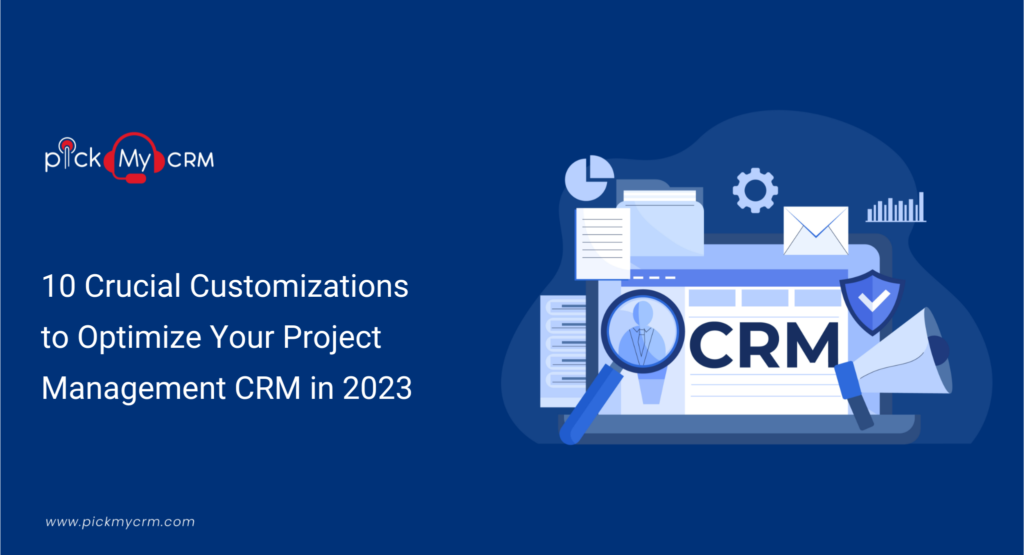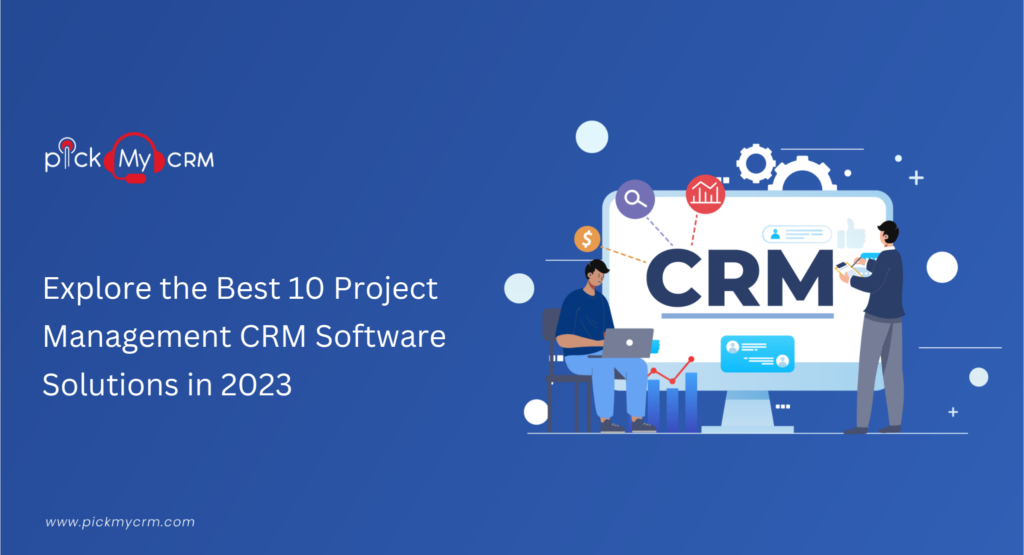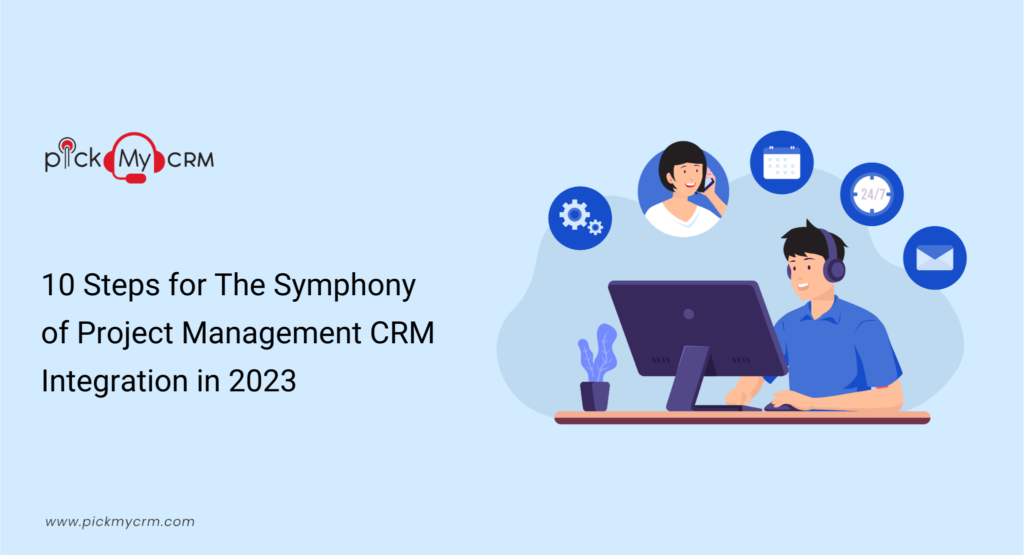10 Essential Customizations for Your Project Management CRM
10 Must-Have Customization of Project Management CRM
The Power of Customization: In a world where no two projects are alike, one-size-fits-all solutions no longer suffice. It is where the power of customization steps in. Customizing your CRM to align with your organization's unique workflow, processes, and terminology can provide benefits. It ensures that the CRM becomes an asset that caters precisely to your project management needs, resulting in streamlined operations and enhanced collaboration. Statistics back the claim: Supporting this assertion with data, a recent survey among enterprises that embraced tailored CRMs unveiled an impressive 92% satisfaction rate. These firms highlighted heightened user adoption, minimized resistance to change, and a remarkable surge in team morale as the outcomes of their customization efforts. Here are the complete details for must-have customizations for a Project Management CRM,Customized Workflows
Customizing workflows within your Project Management CRM involves tailoring the system to mirror your organization's unique project processes. Establish stages, milestones, and approval routes that align with the distinct characteristics of your chosen project management approach. This customization ensures that tasks move smoothly through each phase, minimizing bottlenecks and maintaining a consistent project progression.User Role and Access Control
Implementing user role and access control customization allows you to define and manage who can access certain features and data within the CRM. Varied roles Include project managers, team leads, and clients who must possess separate access privileges to ensure robust data security while fostering seamless collaboration.Custom Data Fields
Crafting custom data fields involves introducing novel elements or adjusting existing ones to capture information tailored to the distinct needs of each project. These fields could include project objectives, specialized KPIs, project dependencies, or any other relevant details unique to your projects. Custom fields provide a structured way to capture and organize project-related information.Task Prioritization and Dependencies
Designing your CRM to support task prioritization and dependencies is essential for effective project management. By implementing this customization, you acquire the ability to assign priority levels to tasks and establish interdependent relationships among tasks that are mutually reliant. Clear visualization of task dependencies prevents confusion and aids in effective resource allocation.Resource Allocation and Scheduling
Customizing your CRM to handle resource allocation and scheduling enhances your ability to manage project resources efficiently. Set up resource availability, assign team members to specific tasks, and create a scheduling mechanism that prevents resource overloading. This customization ensures that resources are utilized optimally throughout the project lifecycle.Customized Reporting and Dashboards
Creating personalized reporting and dashboards empowers you to showcase project data and insights in formats that resonate with your organization's preferences and requirements. Develop visualizations that showcase project progress, resource utilization, and financial metrics in a Format that resonates with stakeholders. Custom reports offer actionable insights for informed decision-making.Integration with Communication Tools
Integrating your CRM with communication tools like email, messaging apps, and video conferencing platforms streamlines project-related discussions and updates. This integration centralizes communication within the CRM, reducing the need to switch between different applications and promoting seamless collaboration.Automated Notifications and Alerts
Establish automated notifications and alerts to ensure team members stay informed about task assignments, approaching deadlines, and vital updates. Customizable alerts guarantee that pertinent stakeholders receive timely information, mitigating the potential for overlooked tasks or critical deadlines.Client Collaboration Portals
In cases where client engagement holds significance, fashioning a dedicated client collaboration portal within the CRM emerges as a valuable customization. This portal Grants clients the ability to monitor project progress, furnish feedback, and access essential documents within a controlled environment. This feature fosters transparency and streamlines efficient communication with clients.Custom Templates and Workspaces
Developing custom project templates and workspaces simplifies project setup and ensures consistency across similar projects. This customization saves time by pre-defining project structures, tasks, and workflows, enabling teams to initiate projects with reduced effort and increased efficiency. By implementing these customizations, your Project Management CRM becomes a tailored solution that caters Precisely to your organization's project management needs. It enhances collaboration, efficiency, and overall project success, helping your team achieve optimal results.When Should You Consider Customization for Project Management CRM?
Deliberation over customization should come into play when,- When your organization's project management processes significantly differ from standard CRM workflows.
- When you're transitioning to a new CRM and want to ensure a smooth adaptation for your team.
- When scaling your projects, you need a CRM that can adapt to increased complexity.
- When existing CRMs lack features necessary for efficient project management.
- When you're looking to improve collaboration and data sharing among team members.
Where Can You Apply Customization?
Customization options can be applied in various aspects of Project Management CRM systems, allowing businesses to tailor the software to their needs. Here are key areas where customization is applicable:- User Interface: Customize the user interface to match your brand's aesthetics and create a familiar look and feel for your team.
- Workflows: Customize workflows to harmonize with your distinct project management methodologies, guaranteeing the smooth execution of projects.
- Task Templates: Create and customize task templates to standardize processes and save time on task creation.
- Reporting and Analytics: Customize reports and dashboards to track project metrics and KPIs relevant to your business.
- Automation Rules: Set up automation rules to automate repetitive tasks, notifications, and reminders based on your specific requirements.
- Permission Settings: Define custom permission levels for team members to control Access to sensitive data and features.
- Integration Points: Customize integration with Other tools and software used in your organization's tech stack.
- Client Portals: Personalize client portals with your branding and choose which project information to share with clients.
- Notification Preferences: Empower team members to personalize their notification preferences, ensuring they receive information according to their requirements.
- Data Fields: Incorporate personalized data fields to capture organization-specific project information of paramount importance.
How to Customize Your Project Management CRM?
Customizing your Project Management CRM involves a series of steps to tailor the software to your needs. Below is a concise guide on how to achieve this,- Assessment: Understand your organization's project management needs, processes, and pain points.
- Identification: Determine which CRM features need customization, such as workflows, data fields, and reporting.
- Prioritization: Decide which customizations are most critical and impactful for your projects.
- Configuration: Utilize the CRM's customization options to implement changes in data fields, workflows, and user roles.
- Testing: Thoroughly test the customized features to ensure they align with your requirements and function as intended.
- Training: Conduct training sessions for your team, educating them about the customized features and how these enhancements contribute to improving project management practices.
- Feedback Loop: Continuously gather feedback from users and make refinements as needed.




